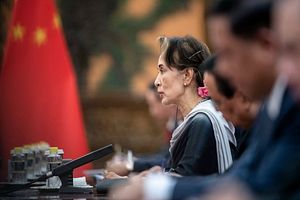China’s increasing influence in Myanmar is bad news for the country’s democracy. Over the last decade, China has expanded its engagement in an effort to strengthen relations with Myanmar’s armed forces, build relations with Aung San Suu Kyi’s government, and improve its public perception in the country. Unsurprisingly, an authoritarian state like China has a different view than the United States on how Myanmar should develop.
Today, China is playing an active role in Myanmar’s peace process, a top priority for Suu Kyi’s government, by facilitating talks between the government and the ethnic militias. China is also funding massive economic development projects throughout the country. But while Beijing diversifies its influence over Myanmar, Washington has done comparatively little to engage this fledgling democracy.
Bordering Myanmar’s most resource-rich state, Kachin, and largest state, Shan, China’s interest is mainly driven by security concerns, economic opportunities, and desire for political influence.
Kachin and Shan states are home to two of the country’s longstanding ethnic conflicts. Fighting between Myanmar’s military and the ethnic militias creates security concerns for Beijing as the conflict sends a rising tide of refugees into China and negatively affects China-Myanmar trade through the border states. In 2011, renewed fighting between the Myanmar military and the Kachin Independence Army drove thousands of Kachin to flee to China, seeking refuge in Yunnan province. These refugee flows across the border draws unwanted international attention to China. Such publicity puts spotlights on China’s own human rights abuses, whether it be against ethnic minorities like the Uyghurs or the forced repatriation of North Korean escapees.
China also sees Myanmar’s geographic location and rich natural resources as strategic economic opportunities. As part of President Xi Jinping’s ambitious infrastructure project, the Belt and Road Initiative, to connect China with Asia, Europe, and Africa, the Chinese are injecting billions of dollars into Myanmar, developing a deep-water port, high-speed railways, natural gas pipelines, and Chinese-style special economic zones.
Beyond these security concerns and economic interests, China is trying to increase its political and social influence in Myanmar as well. China has supported Myanmar at the United Nations Security Council throughout the Rohingya crisis, which has forced more than 700,000 Rohingyas — a Muslim ethnic minority group — to flee to neighboring Bangladesh to escape military atrocities.
By supporting Myanmar’s government on the Rohingya crisis, Beijing increases its popularity among the Burmese, most of whom refer to the Rohingyas as “Bengalis,” illegal immigrants that do not belong in their country. While China has given the government a pass for its scorched earth policies, the United States and other democracies have condemned Myanmar for its wide-scale human rights violations and systematic legal and social discrimination against the Rohingya people.
To balance China’s influence in Myanmar, the United States and its allies must increase and diversify their engagement at both the national and grassroots levels. The current imbalance creates room for China, which has no interest in nurturing a strong democratic nation on its border, to promote its vision of Myanmar, untroubled by democratic principles. This must be rectified as Myanmar’s progress to democracy is still fragile.
When Myanmar started its democratic transition in 2015 after a half century of military rule, the United States and the Burmese people celebrated the birth of the country’s first democratically-elected, civilian-led government. Then-President Barack Obama invited the leader of this movement and Nobel Peace Prize Laureate, Aung San Suu Kyi, for an official visit and lifted long-held U.S. sanctions imposed on Myanmar. During the visit, Suu Kyi thanked the United States for its continued support in fighting for “a truly democratic, federal union — a union in which we can create true strength of our diversity, in which we can celebrate our diversity as a greater resource, a greater richness.”
Today, Suu Kyi and her civilian government have lost their sheen. The authoritarian practices in her government and the strong military role in Burmese politics contradict any early promises she made and are frustrating Myanmar’s transition to democracy. And China’s increasing and widespread influence in Myanmar is further impeding the transition to democracy.
Indeed, under Suu Kyi’s leadership, 44 journalists and 142 activists have faced trial, including two recently released Reuters journalists, who were sentenced to seven-year prison terms for investigating the military’s actions against the Rohingyas. Mounting international pressure was key to releasing the reporters, clearly demonstrating the importance of democratic nations’ role in advocating for freedom in the country.
Unlike what Suu Kyi wished for during her visit to Washington in 2016, the Rohingya crisis, as well as ongoing ethnic conflicts throughout Myanmar, indicate that pluralism has not yet been celebrated as the country’s “greater resources, a greater richness.” The United States and its allies must continue to support Myanmar until a truly democratic government takes root by engaging more directly with the country’s transition. Otherwise, China will influence the country unchallenged.
Jieun Pyun is a senior program manager at the George W. Bush Institute’s Human Freedom Initiative.

































